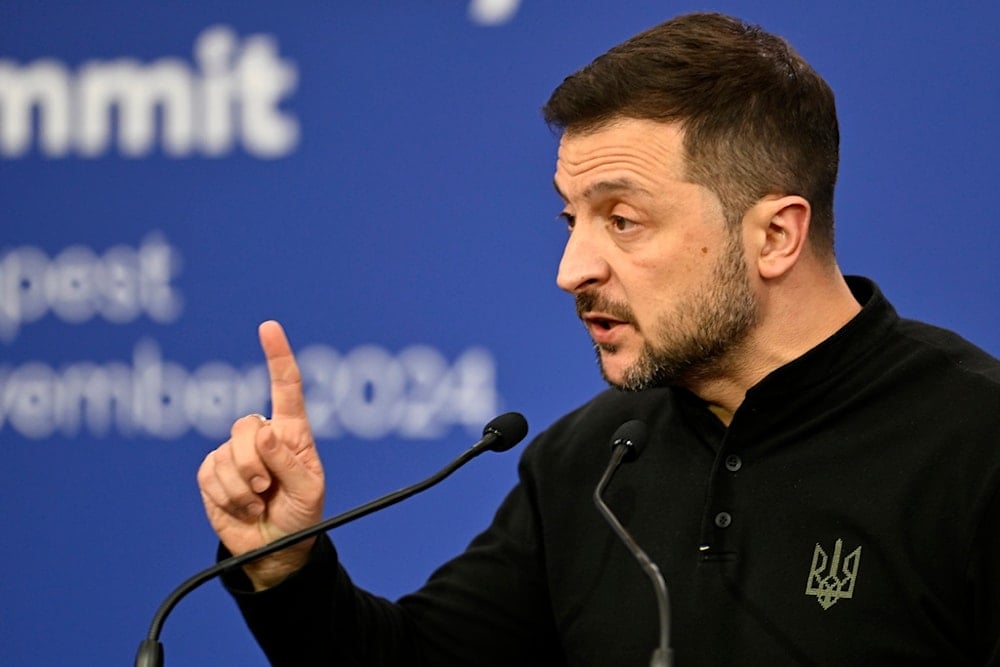Zelensky berates top ally Scholz over call with Putin
Ukrainian President Volodymyr Zelensky voices dissatisfaction over the head of a sovereign nation communicating with Russian President Vladimir Putin.
-

Ukraine's President Volodymyr Zelenskyy speaks during a press conference during the European Political Community (EPC) Summit at the Puskas Arena in Budapest, Hungary, Thursday, November 7, 2024 (AP)
Ukrainian President Volodymyr Zelensky has criticized a recent phone call between German Chancellor Olaf Scholz and Russian President Vladimir Putin, calling it a "Pandora's box" that undermines international efforts to isolate the Russian leader.
"This is exactly what Putin has been wanting for a long time: it is extremely important for him to weaken his isolation," Zelensky stated, warning that the call risks giving Russia a foothold in negotiations that he claims may yield little progress.
Friday's conversation marked the first time Scholz had spoken to Putin in two years.
Putin has not talked with most NATO and Western leaders since 2022 when the EU and US slapped heavy sanctions on Russia for the war in Ukraine, yet he maintains contact with Hungarian Prime Minister Viktor Orban, who is skeptical of Western policy toward Russia, and Turkish President Recep Tayyip Erdogan.
The German chancellor pressed Putin to withdraw his forces from Ukraine and urged him to engage in peace talks with Kiev, with the goal of achieving what Germany calls a "just and lasting peace," according to a German government spokesperson.
Russian territories must be recognized
Putin, however, reportedly told Scholz that any peace agreement must recognize Russia's security interests and the "new territorial realities," as per the Kremlin's statement.
The Kremlin statement revealed that the call was held "on the initiative of the German side," asserting that the aides of Putin and Scholz will be in touch.
During the call, Putin stressed that Russia has never rejected and is still willing to resume talks on Ukraine.
"The Russian side has never refused and remains open to resuming the negotiations that were interrupted by the Kiev regime. Russia's proposals are well known and were outlined, in particular, in a speech at the Russian Foreign Ministry in June," the statement explained.
Meanwhile, a German government spokesperson said in a written statement, “The Chancellor urged Russia to be prepared to negotiate with Ukraine with the aim of achieving a just and lasting peace."
Sources familiar with the call told Reuters that Zelensky and other European officials had previously advised Scholz against it, suggesting the move may have been politically motivated.
Mounting pressures
The chancellor faces a snap election on February 23, and his Social Democrat party has been under pressure from domestic populist factions advocating for diplomacy over prolonged military engagement.
"The chancellor urged Russia to show willingness to enter talks with Ukraine," a German government spokesperson stated, stressing that Germany remains committed to supporting Ukraine "for as long as necessary" against Russia.
Zelensky, however, dismissed the call's effectiveness, arguing that it enabled Russia to maintain its policies unchanged. "This made it possible for Russia to do nothing in essence, and this is exactly what led to this war," he stated in his nightly address.
The call also came just days after US President-elect Donald Trump's victory. Trump had hinted he could quickly end the war, though he has yet to specify how, and has repeatedly criticized Western aid levels to Ukraine.
"It sends a bad signal, especially after Trump's election," one Western diplomat told Reuters, revealing that some allied countries had advised Berlin against the call.
"My hope is that Scholz can now say to his electorate, ‘look, I have done it, and it's a waste of time as Putin isn't open to anything.' But it's also a question of how Russia spins it," the diplomat added.
Europe seeks last-minute Ukraine support from Biden: Bloomberg
Europe has made a final appeal to the outgoing Biden administration to boost US support for Ukraine to strengthen Kiev's position as much as possible before the presidential term ends in January.
According to Bloomberg, European leaders and officials have asked the US to provide more weapons and artillery to Ukraine, impose additional sanctions on key Russian sources of income, and target Moscow's ability to acquire banned technologies used in weapons, according to people familiar with the matter. The sources noted that many of the European requests were informal in nature.
The resources mentioned — money, ammunition, and weapons — mainly come from a $61 billion package approved by the US Congress earlier this year.
Despite the dwindling time for Biden to act on the requests, the US is already working to adopt new sanctions against Russia's oil fleet and the DPRK by the end of November, according to anonymous sources.
Many EU leaders are also pushing the US to allow Ukraine to use Western weapons to strike military targets inside Russia despite pushback from German Chancellor Olaf Scholz and Biden, who believe the escalation is not worth the risk.

 5 Min Read
5 Min Read









